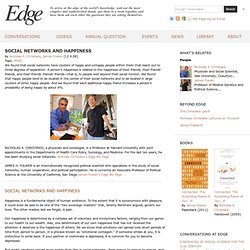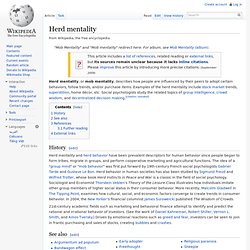

You give me the chills: embodied reactions to in... [Psychol Sci. 2012. 980623conformity.gif (439×332) Humans 'subconsciously mimic other accents', psychologists claim. Mimicry and Mirroring Can Be Good... or Bad.
We're Only Human...: Mimicry and Membership. I once attended an all-male college where the “Greek” system dominated residential and social life.

Each year in the winter, most of the freshmen would “rush” a particular fraternity house, which was little more than a ritualistic way of declaring: "Take me please. I'm just like you.” The ones who were accepted would “pledge” themselves to the house. But many of the hopefuls were not accepted, and the rejects were often deeply disappointed. The Greek system embodies much that is sad and unflattering about human nature, especially the cruelty of exclusion and the often desperate need to belong.
Psychologist Jessica Lakin of Drew University suspected that affiliation is so essential to human functioning that we have deep-wired strategies for gaining entry to life’s groups and clubs. Lakin had a group of student volunteers play Cyberball, an arcade game loosely based on American football. When the Cyberball game was over, the scientists devised another ruse, which they videotaped. Marco Iacoboni Lab: Research. Imitation Control.

Happiness, happy, social networks, contagious, contagion, behaviour, obesity, aging. Happiness and other emotions and behaviours are contagious The Happiness Effect Mimicry The strength of the infection Obesity.

Emotional Contagion Can Take Down Your Whole Team. We had hired a new senior executive. Soon after settling in, he began to share his concerns with me. SOCIAL NETWORKS AND HAPPINESS. Happiness is a fundamental object of human existence.

To the extent that it is synonymous with pleasure, it could even be said to be one of the "two sovereign masters" that, Jeremy Bentham argued, govern our lives. The other master, lest we forget, is pain. Our happiness is determined by a complex set of voluntary and involuntary factors, ranging from our genes to our health to our wealth. Alas, one determinant of our own happiness that has not received the attention it deserves is the happiness of others. Yet we know that emotions can spread over short periods of time from person to person, in a process known as "emotional contagion. " But might emotions spread more widely than this in social networks—from person to person to person, and beyond? We recently published a paper in the British Medical Journal that addressed these questions.
Emotions Are Contagious—Choose Your Company Wisely. In the literature, this process in which a person or a group influences the emotions and affective behavior of another person or group through the conscious or unconcious induction of emotions is referred to as emotional contagion (EC).

And although study after study has demonstrated what a powerful impact it can have on our relationships—domestic partnerships, friendships, teams, business relationships, and groups of all kinds—interestingly, we often don't realize how much our own emotions are influenced by the emotional states of others. The important question is in what direction are your emotions being influenced. Referring to emotions as contagious may connote a negative experience. However, this is not necessarily true. Being "infected" by another person's happiness or enthusiasm can be a very good thing.
Similar results have been found in team sports. Mirror neuron. A mirror neuron is a neuron that fires both when an animal acts and when the animal observes the same action performed by another.[1][2][3] Thus, the neuron "mirrors" the behavior of the other, as though the observer were itself acting.

Such neurons have been directly observed in primate species.[4] Birds have been shown to have imitative resonance behaviors and neurological evidence suggests the presence of some form of mirroring system.[4][5] In humans, brain activity consistent with that of mirror neurons has been found in the premotor cortex, the supplementary motor area, the primary somatosensory cortex and the inferior parietal cortex.[6] The function of the mirror system is a subject of much speculation. Discovery[edit] Further experiments confirmed that about 10% of neurons in the monkey inferior frontal and inferior parietal cortex have "mirror" properties and give similar responses to performed hand actions and observed actions. Origin[edit] In monkeys[edit] Exuberance: The Passion for Life - Kay Redfield Jamison. Www.antoniahamilton.com/hamilton_qjep_final.pdf.
“Herd” Mentality Explained. By Rick Nauert PhD Senior News Editor Reviewed by John M.

Grohol, Psy.D. on February 15, 2008 A new research study sheds light on a behavior that is consistent among many species – that is, making decisions based upon the actions of others. Scientists at the University of Leeds believe they may have found why humans flock like sheep and birds, subconsciously following a minority of individuals. Researchers discovered that it takes a minority of just five per cent to influence a crowd’s direction – and that the other 95 per cent follow without realizing it. The findings could have major implications for directing the flow of large crowds, in particular in disaster scenarios, where verbal communication may be difficult. “There are many situations where this information could be used to good effect,” says Professor Jens Krause of the University’s Faculty of Biological Sciences.
“We’ve all been in situations where we get swept along by the crowd,” says Professor Krause. Herd mentality. Herd mentality, or mob mentality, describes how people are influenced by their peers to adopt certain behaviors, follow trends, and/or purchase items.

Examples of the herd mentality include stock market trends, superstition, home décor, etc. Social psychologists study the related topics of group intelligence, crowd wisdom, and decentralized decision making. [citation needed] History[edit] Herd mentality and herd behavior have been prevalent descriptors for human behavior since people began to form tribes, migrate in groups, and perform cooperative marketing and agricultural functions. 21st-century academic fields such as marketing and behavioral finance attempt to identify and predict the rational and irrational behavior of investors. Mob Mentality" When a group of people has assembled because they're emotional and angry about something, it only takes one act of violence to whip the crowd into a fury.

Others will follow the initial rioter's lead and begin destroying property or hurting people. A lot of research has been conducted into the mindset of a violent mob. Being part of a group can destroy people's inhibitions, making them do things they'd never otherwise do. Happiness, happy, social networks, contagious, contagion, behaviour, obesity, aging.